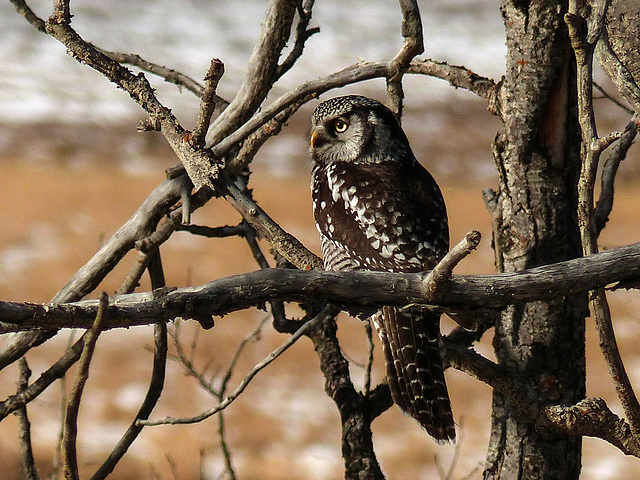An unusually pale American Robin
Red Squirrel
Swivel-head
Dainty little Common Redpoll
Time for an old barn again
One year ago
A photographer's nightmare
The cross and the moon
'Superman, where are you now?'
Pine Grosbeak / Pinicola enucleator
Little country church
A quick glance
Sweet little garden ornament
Delicate colours of summer
Varied Thrush - a lifer
Northern Hawk Owl with Meadow Vole
Aging gracefully
Common Redpoll / Carduelis flammea
A friendly greeting
When the clouds roll in
Davisburg Community Church, Alberta
Fancy silo with stairs
One of yesterday's Snowy Owls
Little Downy Woodpecker at work
Dianthus sp.
On the hunt
Taking the quieter road
Pine Grosbeak
Short-eared Owl
Embracing the sun
Eurasian Collared-Dove / Streptopelia decaocto
Much better than a utility pole
Rent a canoe at Emerald Lake
Dainty little Common Redpoll
Yesterday's treat
A quick drive-by shot
A great winter for Pine Grosbeaks
One of my favourite birds to photograph
Beware those icy fingers
Wearing a heavy coat of hoar frost
Pine Grosbeak / Pinicola enucleator
European Pasque Flower / Pulsatilla vulgaris
A fence without an owl
Matching colours
One day closer to spring
See also...
See more...Keywords
Authorizations, license
-
Visible by: Everyone -
All rights reserved
-
231 visits
Pretty good camouflage


The open eyes of an owl tend to give it away, no matter how well the rest of the bird might be camouflaged. Rather a cluttered photo, but I think it gives an idea of how we sometimes see this bird. Actually, I think I prefer this photo to seeing one perched on top of a utility pole, ha.
It had been almost four years since many of us were fortunate enough to make visits to a family of Northern Hawk Owls, NW of Calgary. I was so thrilled to see this adult two days ago, 8 February 2016, again NW of the city. It's a one and a half hour drive for me to get there, so not a drive I care to do very often - roughly 220 km round trip. Great to see a few familiar faces up there, too : )
It was like a spring day that day, sunny, pleasant and not cold. I really wanted to get over there before we get our next snowfall and it seemed a perfect day to go. There were three or four cars parked at the side of the road when I arrived at the area and everyone let me know that the owl had been close to the road just before I arrived, but had now disappeared way across a huge field. "You just missed it!" - never words one wants to hear, lol! However, I was assured it would be back - and that is what happened.
"The type of prey the Hawk-Owl catches will determine its eating strategy. For mammalian prey the ritual is generally the same: the Northern Hawk-Owl will eviscerate its prey, eats the head first (especially for prey like the red squirrel, whose head is fairly large), and then—when tackling larger prey—it will eat the organs and cache the remains; with smaller prey, the owl will simply swallow the body whole."
en.wikipedia.org/wiki/Northern_Hawk-Owl
"The Northern Hawk Owl can detect prey by sight at a distance of up to 800 meters (half a mile). Though it is thought to detect prey primarily by sight, the Northern Hawk Owl can find and seize prey under 30 cm (1 foot) of snow." From AllAboutBirds.
www.allaboutbirds.org/guide/northern_hawk_owl/lifehistory
It had been almost four years since many of us were fortunate enough to make visits to a family of Northern Hawk Owls, NW of Calgary. I was so thrilled to see this adult two days ago, 8 February 2016, again NW of the city. It's a one and a half hour drive for me to get there, so not a drive I care to do very often - roughly 220 km round trip. Great to see a few familiar faces up there, too : )
It was like a spring day that day, sunny, pleasant and not cold. I really wanted to get over there before we get our next snowfall and it seemed a perfect day to go. There were three or four cars parked at the side of the road when I arrived at the area and everyone let me know that the owl had been close to the road just before I arrived, but had now disappeared way across a huge field. "You just missed it!" - never words one wants to hear, lol! However, I was assured it would be back - and that is what happened.
"The type of prey the Hawk-Owl catches will determine its eating strategy. For mammalian prey the ritual is generally the same: the Northern Hawk-Owl will eviscerate its prey, eats the head first (especially for prey like the red squirrel, whose head is fairly large), and then—when tackling larger prey—it will eat the organs and cache the remains; with smaller prey, the owl will simply swallow the body whole."
en.wikipedia.org/wiki/Northern_Hawk-Owl
"The Northern Hawk Owl can detect prey by sight at a distance of up to 800 meters (half a mile). Though it is thought to detect prey primarily by sight, the Northern Hawk Owl can find and seize prey under 30 cm (1 foot) of snow." From AllAboutBirds.
www.allaboutbirds.org/guide/northern_hawk_owl/lifehistory
Fred Denis has particularly liked this photo
- Keyboard shortcuts:
Jump to top
RSS feed- Latest comments - Subscribe to the comment feeds of this photo
- ipernity © 2007-2024
- Help & Contact
|
Club news
|
About ipernity
|
History |
ipernity Club & Prices |
Guide of good conduct
Donate | Group guidelines | Privacy policy | Terms of use | Statutes | In memoria -
Facebook
Twitter

Sign-in to write a comment.